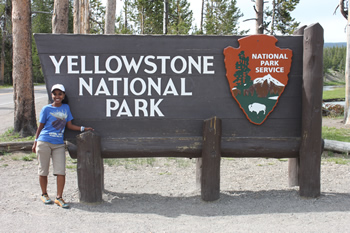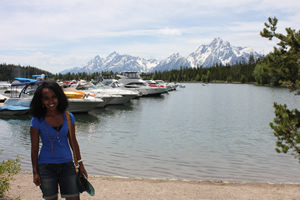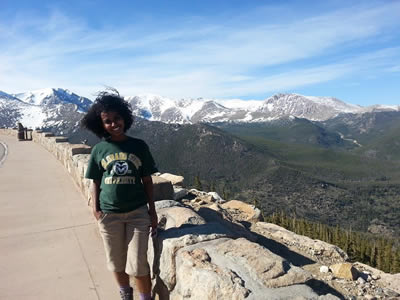September 10, 2014
By Bethlehem Abebe
Instructor at Wondo Genet College of Forestry and Natural Resources, Ethiopia
 This past spring, I had the opportunity to do a four month Internship at Warner College of Natural Resources, Colorado State University. This internship was a part of a Masters program I was pursuing in Leisure, tourism and Environment at Wageningen University, the Netherlands. Prior to coming to CSU, I had completed research concerning natural resource conflicts in Abijata Shalla Lakes National Park, Ethiopia and on the role of tourism in natural resource conservation endeavors. Having dealt with inspiring theoretical framings in research methods during my Masters study and being introduced to the complexities in natural resource management endeavors during my thesis, I was interested to learn and experience how the professional academic environment engaged with these issues during my internship.
This past spring, I had the opportunity to do a four month Internship at Warner College of Natural Resources, Colorado State University. This internship was a part of a Masters program I was pursuing in Leisure, tourism and Environment at Wageningen University, the Netherlands. Prior to coming to CSU, I had completed research concerning natural resource conflicts in Abijata Shalla Lakes National Park, Ethiopia and on the role of tourism in natural resource conservation endeavors. Having dealt with inspiring theoretical framings in research methods during my Masters study and being introduced to the complexities in natural resource management endeavors during my thesis, I was interested to learn and experience how the professional academic environment engaged with these issues during my internship.
As an academic staff of Wondo Genet College, an institute largely dealing with natural resource management issues, WCNR’s active research and educational setting provided me with an ideal learning environment where relevant and valuable experiences could be shared. Thus, it was a unique and valuable learning opportunity to do my internship at CSU where I found the exposure to a professional setting to broaden my insights on applied, cross disciplinary research and education. It was an ideal institution to both apply and learn research and teaching skills, tools and techniques. Although I was mainly involved with activities within the Natural Resource Ecology Laboratory (NREL), I found myself increasingly linked with a number of other departments and programs. One of the lasting impressions from my involvement with the various CSU and WCNR departments is the strong presence of cross disciplinary and collaborative research and academic works in dealing with conservation and sustainable development concerns.
Thus, it was a unique and valuable learning opportunity to do my internship at CSU where I found the exposure to a professional setting to broaden my insights on applied, cross disciplinary research and education. It was an ideal institution to both apply and learn research and teaching skills, tools and techniques. Although I was mainly involved with activities within the Natural Resource Ecology Laboratory (NREL), I found myself increasingly linked with a number of other departments and programs. One of the lasting impressions from my involvement with the various CSU and WCNR departments is the strong presence of cross disciplinary and collaborative research and academic works in dealing with conservation and sustainable development concerns.
My internship focused on developing practical professional skills as an academic and researcher. It involved taking part in the wide variety of CSU research and educational activities, such as attending and presenting in classroom lectures; participating in trainings, workshops and symposiums; event planning; field trips and educational programs in natural resource conservation and sustainable development. The work environment at CSU presented an ideal environment to learn and develop professional academic and research skills. These were valuable experiences, allowing me to observe and participate with ongoing scientific undertakings towards addressing complex environmental issues, both locally as well as internationally. It was particularly useful to be introduced to initiatives that attempt to link research and education with public engagement.
Several presentations and seminars that I participated in emphasized cross disciplinary, innovative and problem oriented research methods. As an example; a series of panels organized by the School of Global Environmental Sustainability (SoGES) addressed a broad range of cross cutting issues on global sustainability. This brought in students and faculty from various schools and departments such as Ecosystem Science and Sustainability; Natural Resource Ecology Laboratory, Biology, and Anthropology. Furthermore, a number of practitioners (such as governors, pastoralists, policy makers) and other professionals were included as participants. These participants always called for interdisciplinary, cross-sector and integrated approaches in addressing the interlaced environmental and social problems.
Recurrent exposure to these seminars and presentations broadened my insights on cross disciplinary research approaches. A particular case was serving as a panelist in a symposium organized by the School of Global Environmental Sustainability (SoGES) under the theme “Future of Africa under Global Environmental Change: Solution Based approaches to Sustainability and Development.” The breadth of topics addressed in this symposium including Global health, Food and Water, Ecosystem services and Biodiversity, Governance, Equity and Energy, was indicative of the need for integrated approaches. The symposium was also significant in that it brought me into contact with a broad range of researchers, paving way for further collaboration. Equally significant was the opportunity to present a brief summary of my graduate research in Ethiopia as a case study in the panel discussion on Ecosystem Services and Biodiversity. Preparing for and presenting the case study, involved undertaking literature review, summarizing relevant points from these literatures and the thesis I had done. Being a speaker on the panel discussion also entailed working on improving my pubic speech skills. This was an important learning goal I had set out to improve as it is valuable virtue in upcoming teaching endeavors as well as in communicating research outcomes.
Another important and unexpected skill I acquired during my internship was a basic understanding of GIS, starting with introductory GPS lessons and moving through a series of 10 training modules developed at by the GeoSpatial Centroid. The opportunity to interface with GIS technology and its applicability in research, including mapping of ecosystem services and biodiversity, was a great addition to my education. Through the tutorials, materials and insights I acquired, I plan to further develop my skills in GIS. I also see great application of these skills in my upcoming research projects in natural resource conservation topics.
My internship has been an invaluable experience in terms of developing both my professional and personal educational goals. I was encouraged to tap into the diverse experience the university and community provided. I was able to increase my network through involvement in different departments, programs and activities both within CSU and the Ft. Collins community. I had the opportunity to learn from external partners including land management agencies such as Rocky Mountains National Park, Larimer Country Open Space, City of Fort Collins Natural Areas, and the Colorado State Forest Service. Some of these experiences included environmental education programs and recreational events such as the ‘Get Outdoors’ event jointly organized by the Larimer Country Open Space, City of Fort Collins Natural Areas, private sponsors and non-profits. Another event was an environmental education program organized for elementary school students by Rocky Mountains National Park. These community-oriented activities demonstrated the active involvement of the community, both as active users of recreational opportunities as well as providers of natural resource management activities. Being exposed to these agencies was a useful way to learn about the synergies between the university and agencies in terms of sharing staff, research training and resources. In Rocky Mountains National Park I was introduced to the Continental Divide Research Unit that is responsible for evaluating and coordinating research undertaking in the park. With a strong connection to CSU, the department benefits from initiating relevant research programs as well as monitoring research outputs in a way that aligns with common goals.
Some of these experiences included environmental education programs and recreational events such as the ‘Get Outdoors’ event jointly organized by the Larimer Country Open Space, City of Fort Collins Natural Areas, private sponsors and non-profits. Another event was an environmental education program organized for elementary school students by Rocky Mountains National Park. These community-oriented activities demonstrated the active involvement of the community, both as active users of recreational opportunities as well as providers of natural resource management activities. Being exposed to these agencies was a useful way to learn about the synergies between the university and agencies in terms of sharing staff, research training and resources. In Rocky Mountains National Park I was introduced to the Continental Divide Research Unit that is responsible for evaluating and coordinating research undertaking in the park. With a strong connection to CSU, the department benefits from initiating relevant research programs as well as monitoring research outputs in a way that aligns with common goals.
Each day presented an opportunity to meet or work along experienced faculty, graduate and undergraduate students and staff involved with programs related to natural resources. From these personal interfaces, I learned about personal commitment, teamwork, coordination, creativity and innovation. Being a part of both formal and informal work related cultures I learned to appreciate and integrate the concept of time management, punctuality and assertiveness. The internship opportunity was also quite unique in that I had many opportunities to integrate with the community, to both learn and share interesting cultural elements.
Overall, my internship at CSU and my stay in Colorado was rewarding in many different aspects. The combination of an engaging and active professional environment and a culturally engaging community setting has enabled me gain a well- rounded, worthwhile and inspiring international experience. The internship opportunity at Colorado State University was one of the best elements of my international Masters Program. I have been inspired me in many ways: concerning my future contributions to Wondo Genet College of Forestry and Natural Resources as well as my long-term professional development aspirations. I look forward in continuing my work with the many friends and colleagues I have made at CSU.